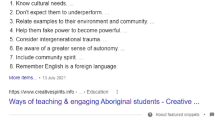Abstract
This work can be understood as a set of ideas on the indigenous teacher education when the teacher educator is external to the indigenous culture and he/she assumes to take into account the culture that each one brings inside oneself. These ideas represent what we have learnt/perceived from our experience as indigenous teacher educator in terms of the perspectives we need to focus in this movement and the great number of challenges we become aware we have to face. This paper presents some perspectives, different points of view, conflicts and challenges of socio-anthropologic-political, psycho-epistemological, ethnic-linguistics orders as well as a critical evaluation on the indigenous teacher education and the education of the indigenous teacher as a student.
Similar content being viewed by others
Notes
Since May of 2002, in a partnership of the College of Education/USP and the Secretary of Education of São Paulo, I have co-ordinated the Indigenous Teacher Education Program for the Elementary Level [Programa de Formação Magistério do Professor Indígena para Educação Infantil e Séries Iniciais (1ª à 4ª) do Ensino Fundamental]. Its basic intent has been to reorient a proposal of learning/teaching for the elementary education schools of the indigenous villages in the State of São Paulo, in a way that the indigenous teacher takes over the school of the village. I was also responsible for the lessons of the mathematics course, as part of the Indigenous Education Program curriculum. Sixty-one indigenous professors—from 21 different villages located in different regions of São Paulo, 20 of them in each Educational Center (Cefam-Bauru, Guarujá and Tucuruvi-SP)—have participated in this formation, where they developed concomitantly basic education and specialized education. It is important to highlight that the indigenous teachers, who have not completed basic education, would have to attend a basic education course, with duration of 6 months; the others started a stage called specific, which would be equal to a work at high school level, according the indigenous education curriculum. I co-ordinated the Intercultural Undergraduate Indigenous Teacher Course for the Elementary Level [Formação Intercultural Superior do Professor Indígena para Educação Infantil e Séries Iniciais (1ª à 4ª) do Ensino Fundamental], at the School of Education of the University of São Paulo, which began in June/2005 and ended up in June/2009.
References
Alangui, W. (2006). Mutual interrogation as an ethnomathematical approach. http://www.math.auckland.ac.nz/Events/2006/ICEM3/2.Prez%20Given/Prez%20given%20ppt/Alangui-prez.ppt. Accessed 8 March 2009.
Barton, B. (2004). Dando sentido a etnomatemática: etnomatemática fazendo sentido. In M. C. S. Domite, R. Ferreira, & J. P. M. Ribeiro (org.), Etnomatemática: papel, valor e significado (pp. 39–74). São Paulo: Zouk.
Barton, B., & Alangui, W. (2004a). Ethnomathematics and indigenous people’s education. Educational Studies in Mathematics, 56, 2–3.
Barton, B., & Alangui, W. (2004). A methodology for ethnomathematics. In Proceedings of the second international conference on ethnomathematics, ICEM-2, Ouro Preto, MG.
Bishop, A. J. (1988). Mathematical enculturation: a cultural perspective on mathematics education. The Netherlands: Kluwer Academic Publishers.
Carvalho, V. (2007). Mathematics education and society (MES): a constituição de uma comunidade de prática científica internacional. Tese de doutorado. Faculdade de Educação da Universidade de Campinas-Feunicamp.
D’Ambrosio, U. (2001). Etnomatemática: elo entre as tradições e a modernidade. Belo Horizonte: Autêntica.
D’Ambrosio, U. (2002). Palestra de abertura do Curso de Formação de Professores Indígenas do Estado de São Paulo. Um Caminho do Meio (da proposta à interação). São Paulo: SEE-SP/FEUSP.
D’Ambrosio, U., & Domite, M. C. S. (2007). The potentialities of (ethno) mathematics education: Ubiratan D Ambrosio an interview with Maria do Carmo Domite. In B. Atweh (Australia), M. Borba (Brazil), A. C. Barton (USA), N. Gough (Australia), C. Keitel (Germany), C. Vistro-Yu (Philippines), & R. Vithal (South Africa) (org.), Internationalisation and globalisation in mathematics and science education (Vol. 1, pp. 1–544). Dordrecht, the Netherlands: Springer Science + Business Media B.V.
Domite, M. C. S. (2005). Etnomatemática em ação (Vol. especial, pp. 81–84). São Paulo: Scientific American Brasil.
Domite, M. C. S., Ferreira, R., & Rodrigues, M. (2009). A Formação de Professores e suas Relações com Cultura e Sociedade: a educação escolar indígena no centro das atenções. Bolema. Boletim de Educação Matemática (Vol. 34, p. 50). Rio Claro: UNESP.
Ferreira, R., & Ribeiro, J. P. M. (2004). Etnomatemática e Educação Escolar Indígena: Um Diálogo Necessário. In M. C. S. Domite, R. Ferreira, & J. P. M. Ribeiro (org.), Etnomatemática: papel, valor e significado (pp.149–160). São Paulo: Zouk.
Ferreira Kawall, M. L. (2002). Idéias Matemáticas de Povos Culturalmente distintos. São Paulo: Global.
Ferreira Sebastiani, E. (2004). Os Índios Waimiri-Atroari e a etnomatemática. In G. Knijnik, F. Wanderer, C. J. Oliveira (Eds.), Etnomatemática. Currículo e formação de professores (pp. 70–88). Santa Cruz do Sul: Edunisic.
Ferreira Sebastiani, E. (2005). Racionalidade dos índios brasileiros (Vol. especial, pp. 90–93). São Paulo: Scientific American Brasil.
Freire, P. (1987). A Pedagogia do Oprimido. São Paulo: Editora Paz e Terra.
Freire, P. (2002). Pedagogia da autonomia—saberes necessários a prática educativa. Rio de Janeiro: Paz e Terra.
Freire, P., & Faundez, A. (1986). Por uma pedagogia da pergunta. São Paulo: Editora Paz e Terra.
Grupioni, L. D. B. (2003). Experiências e Desafios na Formação de Professores Indígenas no Brasil. Revista Enfoque: Qual é a questão, 76, 13–18.
Horsthemke, K., & Schäfer, M. (2006). Ethnomathematics and education: Some thoughts on the allegation of recent developments and current directions. www.math.auckland.ac.nz/Events/2006/ICEM3/2.Prez%20Given/Prez%20given%20papers/Horsthemke2-paper.doc. Accessed 8 March 2009.
Kline, M. (1953). Mathematics in Western culture. New York: Oxford University Press.
Monte, L. N. (1999). Formação de professores indígenas. Presença Pedagógica, 5, 26.
Skovsmose, O. (2002). Foreground e as políticas de aprendizagem por obstáculos. In M. C. S. Domite, R. Ferreira, & J. P. M. Ribeiro (org.), Etnomatemática: valor, papel e significado (pp. 103–122). São Paulo: Editora Zouk.
Vithal, R., & Skovsmose, O. (1997). The end of innocence: A critique of ethnomathematics. Educational Studies in Mathematics, 34(2), 131–157.
Author information
Authors and Affiliations
Corresponding author
Rights and permissions
About this article
Cite this article
do Carmo Santos Domite, M. The encounter of non-indigenous teacher educator and indigenous teacher: the invisibility of the challenges. ZDM Mathematics Education 42, 305–313 (2010). https://doi.org/10.1007/s11858-010-0249-6
Accepted:
Published:
Issue Date:
DOI: https://doi.org/10.1007/s11858-010-0249-6




